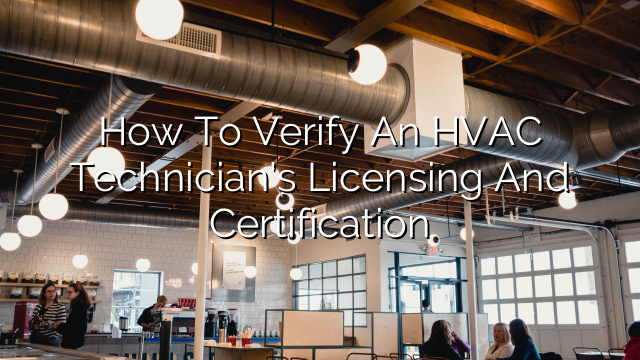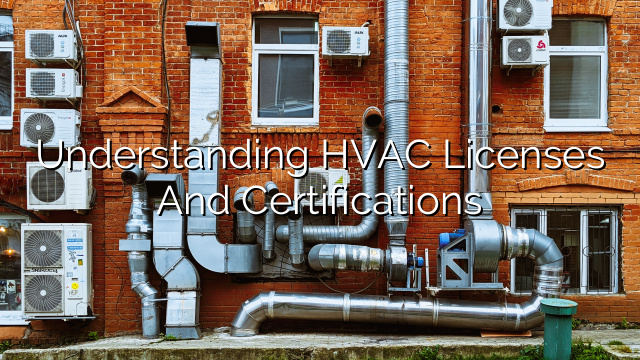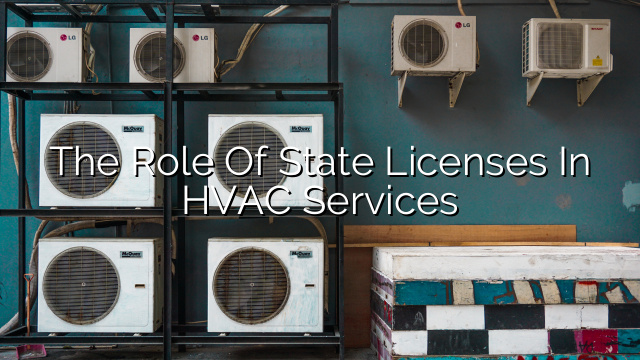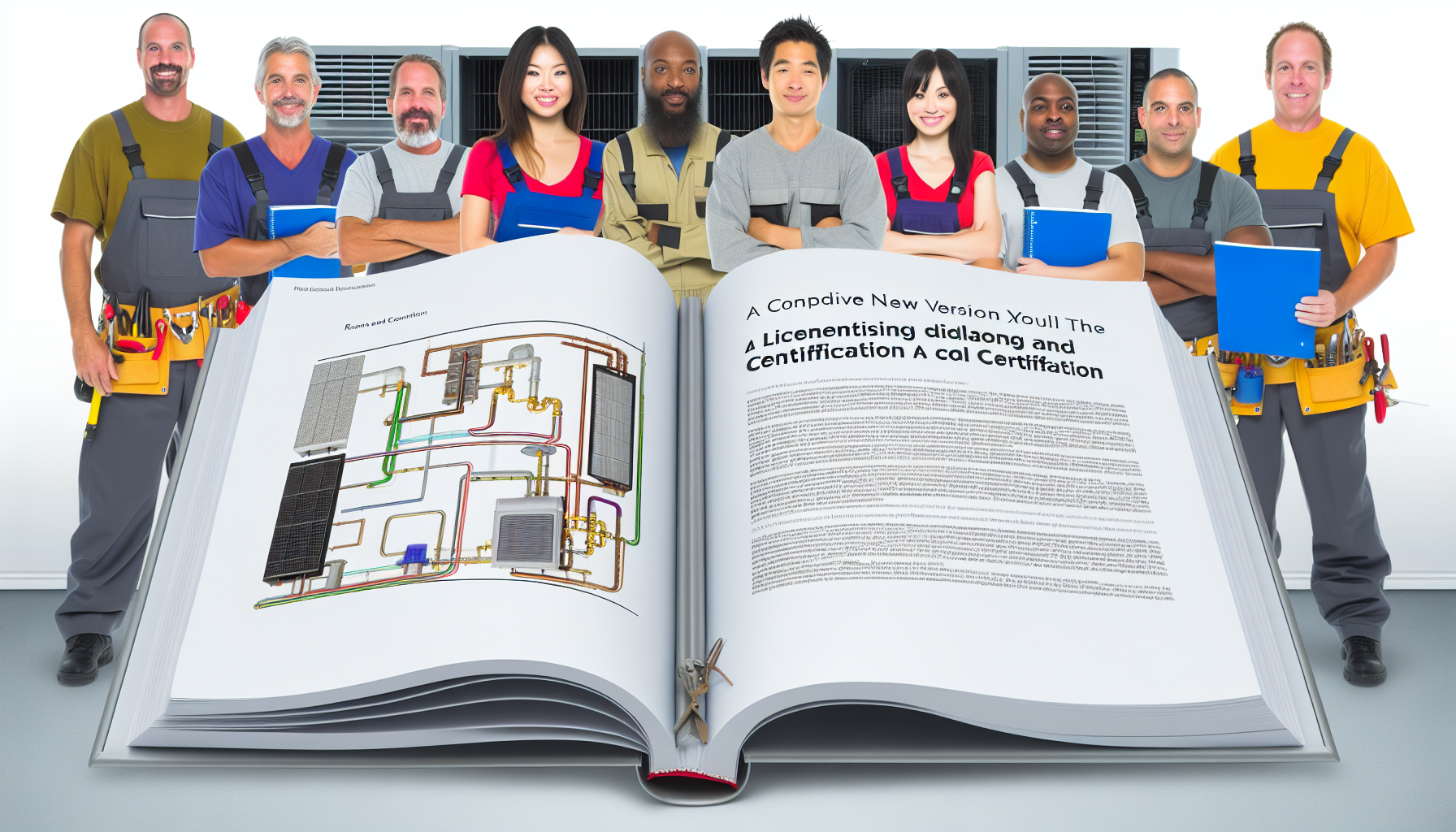Licensing and Certification: Why They Matter in Choosing an HVAC Technician
When it comes to hiring an HVAC (Heating, Ventilation, and Air Conditioning) technician, there are many factors to consider. You want to make sure you’re hiring someone who is qualified and knowledgeable in their field. One of the most important factors to consider is whether the technician is licensed and certified. In this blog post, we will discuss the importance of licensing and certification in choosing an HVAC technician.
What is Licensing?
Licensing is a process that HVAC technicians go through to obtain a license to practice their profession legally. In order to obtain a license, technicians must meet certain requirements set by the state or local government. These requirements typically include completing a training program, passing an exam, and fulfilling a certain number of work experience hours. Once technicians have met these requirements, they are eligible to apply for a license.
Why is Licensing Important?
There are several reasons why licensing is important when it comes to hiring an HVAC technician:
- Legal Compliance: Hiring a licensed technician ensures that you are working with someone who is compliant with local and state regulations. This means that the technician is trained to meet safety standards and is aware of the codes and regulations that govern HVAC installations and repairs.
- Quality Assurance: Technicians who are licensed have gone through a rigorous training program and have demonstrated their competency through an exam. This means that they have the knowledge and skills necessary to perform HVAC installations and repairs correctly and efficiently.
- Accountability: Licensed technicians are held accountable for their work. If something goes wrong during an HVAC installation or repair, you have recourse to file a complaint or seek compensation. This helps protect you as the consumer.
Ultimately, licensing ensures that you are hiring a qualified professional who can be trusted to perform HVAC services safely and effectively.
What is Certification?
Certification is another important aspect to consider when hiring an HVAC technician. While licensing ensures that the technician has met the minimum requirements set by the government, certification goes a step further. It is a voluntary process that technicians can undertake to demonstrate their expertise in specific areas of HVAC.
Why is Certification Important?
There are several reasons why certification is important:
- Specialization: HVAC certification allows technicians to specialize in specific areas of HVAC, such as air conditioning, refrigeration, or energy efficiency. This means that if you have a specific HVAC need, such as installing a new air conditioning unit, you can hire a technician who is certified in that area.
- Continuing Education: In order to maintain their certification, technicians are required to participate in continuing education programs. This ensures that they stay up-to-date with the latest advancements in HVAC technology and techniques. Hiring a certified technician means you are working with someone who has the most current knowledge and skills.
- Credibility: Certification adds credibility to a technician’s qualifications. It shows that they have gone above and beyond the basic requirements and have invested time and effort into furthering their skills. This can give you peace of mind that you are hiring a technician who is committed to their profession.
Certification provides assurance that the technician has advanced knowledge and skills in specific areas of HVAC, making them a valuable asset for your HVAC needs.
FAQs
- Is it necessary to hire a licensed HVAC technician?
Yes, it is necessary to hire a licensed HVAC technician. A licensed technician has met certain requirements set by the state or local government, ensuring their compliance with safety standards and regulations.
- What are the risks of hiring an unlicensed HVAC technician?
Hiring an unlicensed HVAC technician can pose several risks. They may not have the necessary knowledge and skills to perform HVAC services correctly, which can result in faulty installations or repairs. Additionally, if something goes wrong, you may not have recourse to file a complaint or seek compensation.
- How can I check if an HVAC technician is licensed?
You can check if an HVAC technician is licensed by contacting your state or local licensing board. They will be able to verify the technician’s license status.
- Is certification necessary for all HVAC technicians?
Certification is not necessary for all HVAC technicians. It is a voluntary process that allows technicians to demonstrate their expertise in specific areas of HVAC. However, hiring a certified technician can provide additional assurance of their knowledge and skills.
- Are there different types of HVAC certifications?
Yes, there are different types of HVAC certifications. Some examples include certifications for air conditioning, refrigeration, and energy efficiency. Each certification focuses on specific areas of HVAC.
In conclusion, licensing and certification play a crucial role in choosing an HVAC technician. By hiring a licensed technician, you ensure legal compliance, quality assurance, and accountability. Additionally, hiring a certified technician allows you to benefit from their specialization, continuing education, and credibility. When it comes to your HVAC needs, it’s important to prioritize licensing and certification to ensure that you’re working with a qualified professional who can provide the best service possible.










